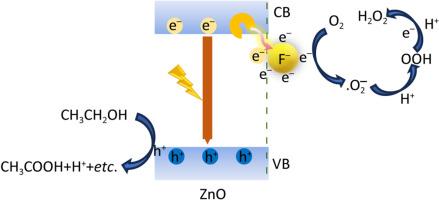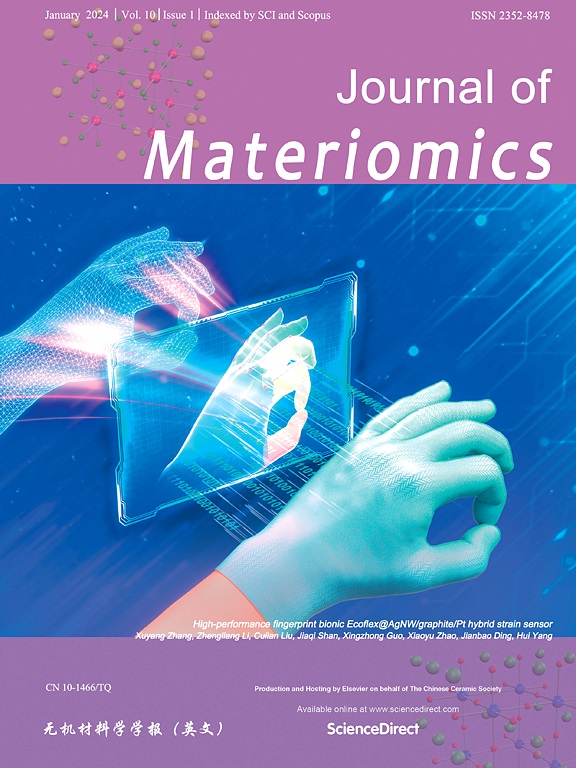F− surface modified ZnO for enhanced photocatalytic H2O2 production and its fs-TAS investigation
IF 8.4
1区 材料科学
Q1 CHEMISTRY, PHYSICAL
引用次数: 0
Abstract
Pure ZnO exhibits low photocatalytic H2O2 production activity due to the rapid charge recombination. To realize the spatial separation of photogenerated electrons and holes, constructing an electron transfer channel on the ZnO surface is an effective approach. This study successfully modified the surface of ZnO using F− (ZnO/F) by introducing NH4F in an aqueous phase photocatalytic system. The F− is adsorbed on the ZnO surface by Coulombic force and significantly improves the photocatalytic H2O2 production performance of ZnO, with the highest efficiency of 4137.2 μmol⋅g−1·L−1·h–1. The photocatalytic performance enhancement mechanism of ZnO/F is explained in terms of electron transfer dynamics by femtosecond transient absorption spectroscopy (fs-TAS) measurements. F− surface modification constructs a new ultrafast electron transport pathway from the ZnO CB to F−, and the optimal ZnO/F exhibits the fastest interfacial electron transfer lifetime of 5.8 ps. The F− surface modification effectively facilitates the charge separation, thereby increasing the number of electrons available for photocatalytic H2O2 reaction. This study has revealed the roles of F− surface modification in the photocatalytic H2O2 production by ZnO and provides guidance for ionic modification to improve photocatalytic performance.


用于提高光催化 H2O2 产率的 F- 表面修饰氧化锌及其 fs-TAS 研究
由于电荷快速重组,纯氧化锌的光催化 H2O2 生成活性较低。为了实现光生电子和空穴的空间分离,在氧化锌表面构建电子传输通道是一种有效的方法。本研究通过在水相光催化体系中引入 NH4F,成功地利用 F- (ZnO/F)修饰了 ZnO 表面。F- 通过库仑力吸附在 ZnO 表面,显著提高了 ZnO 的光催化产生 H2O2 的性能,最高效率达到 4137.2 μmol-g-1-L-1-h-1。飞秒瞬态吸收光谱(fs-TAS)测量从电子传递动力学角度解释了 ZnO/F 的光催化性能增强机制。F- 表面修饰构建了一条从 ZnO CB 到 F- 的新的超快电子传输途径,最佳的 ZnO/F 表现出 5.8 ps 的最快界面电子传输寿命。F- 表面修饰有效地促进了电荷分离,从而增加了可用于光催化 H2O2 反应的电子数量。这项研究揭示了 F- 表面修饰在 ZnO 光催化产生 H2O2 过程中的作用,并为离子修饰提高光催化性能提供了指导。
本文章由计算机程序翻译,如有差异,请以英文原文为准。
求助全文
约1分钟内获得全文
求助全文
来源期刊

Journal of Materiomics
Materials Science-Metals and Alloys
CiteScore
14.30
自引率
6.40%
发文量
331
审稿时长
37 days
期刊介绍:
The Journal of Materiomics is a peer-reviewed open-access journal that aims to serve as a forum for the continuous dissemination of research within the field of materials science. It particularly emphasizes systematic studies on the relationships between composition, processing, structure, property, and performance of advanced materials. The journal is supported by the Chinese Ceramic Society and is indexed in SCIE and Scopus. It is commonly referred to as J Materiomics.
文献相关原料
公司名称
产品信息
阿拉丁
Ammonium fluoride (NH4F)
阿拉丁
Sodium Fluoride (NaF)
阿拉丁
aqueous ammonia (NH3·H2O)
阿拉丁
Ammonium chloride (NH4Cl)
阿拉丁
ethanol
阿拉丁
silver nitrate (AgNO3)
阿拉丁
triethanolamine
阿拉丁
isopropanol
阿拉丁
potassium iodide (KI)
阿拉丁
1,4-benzoquinone
 求助内容:
求助内容: 应助结果提醒方式:
应助结果提醒方式:


